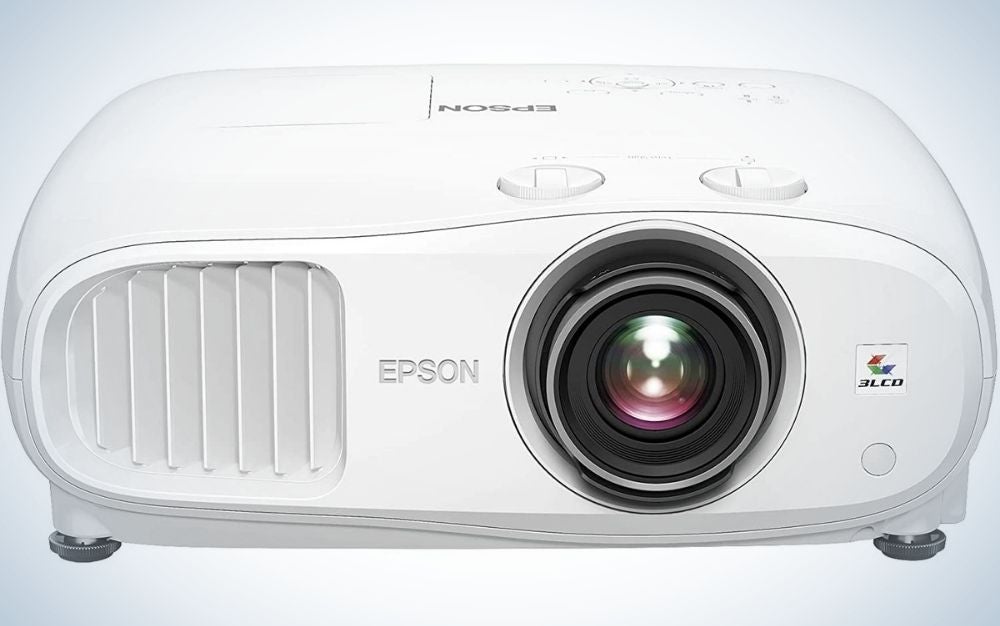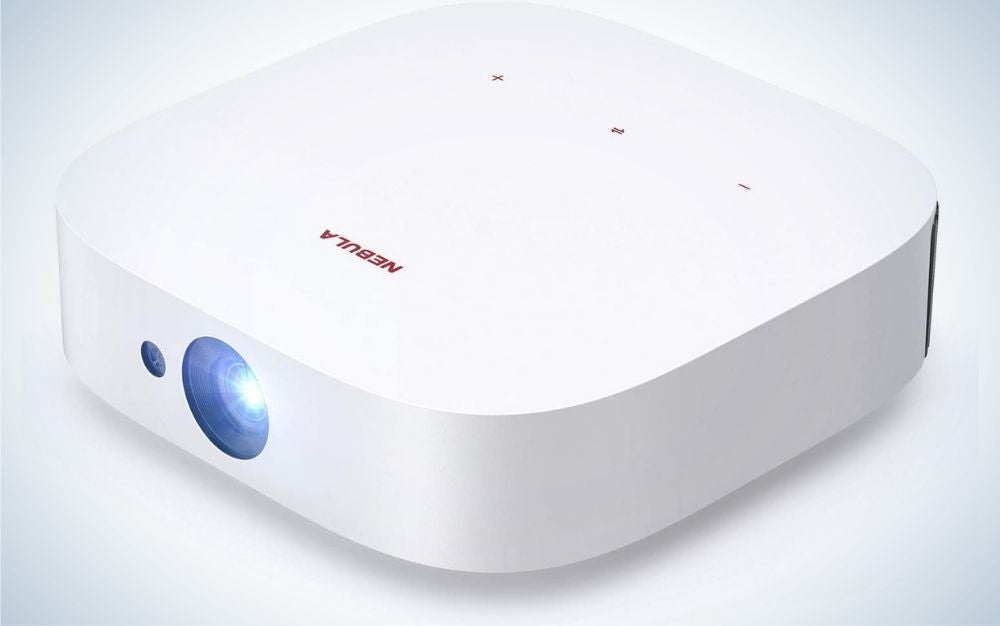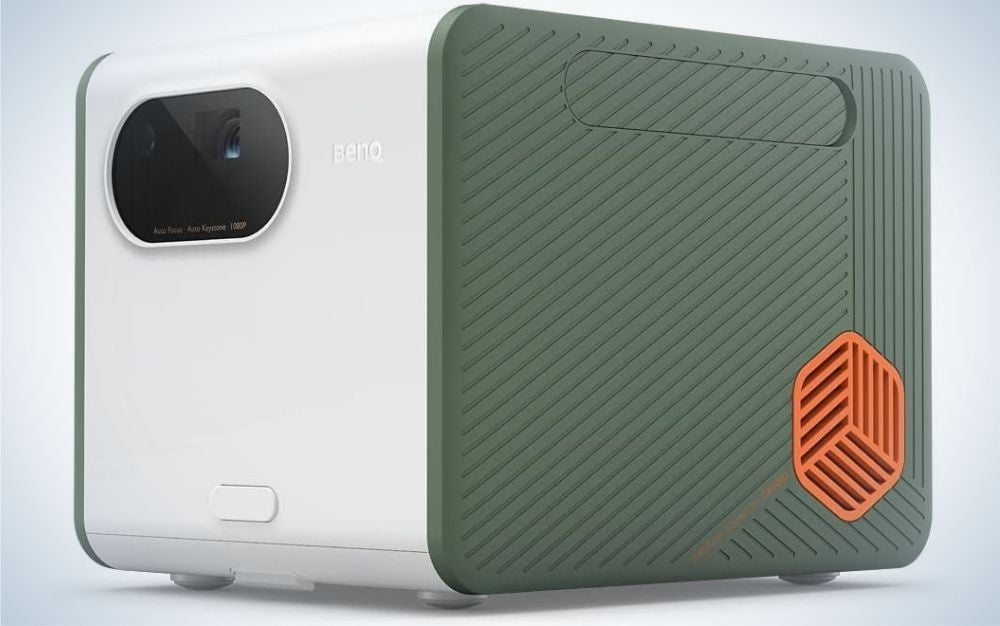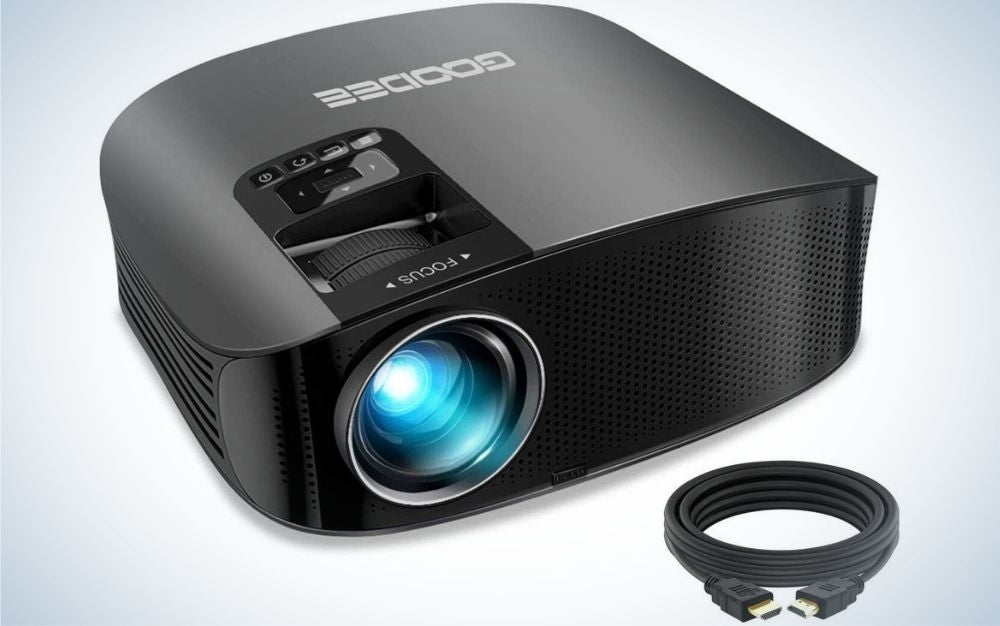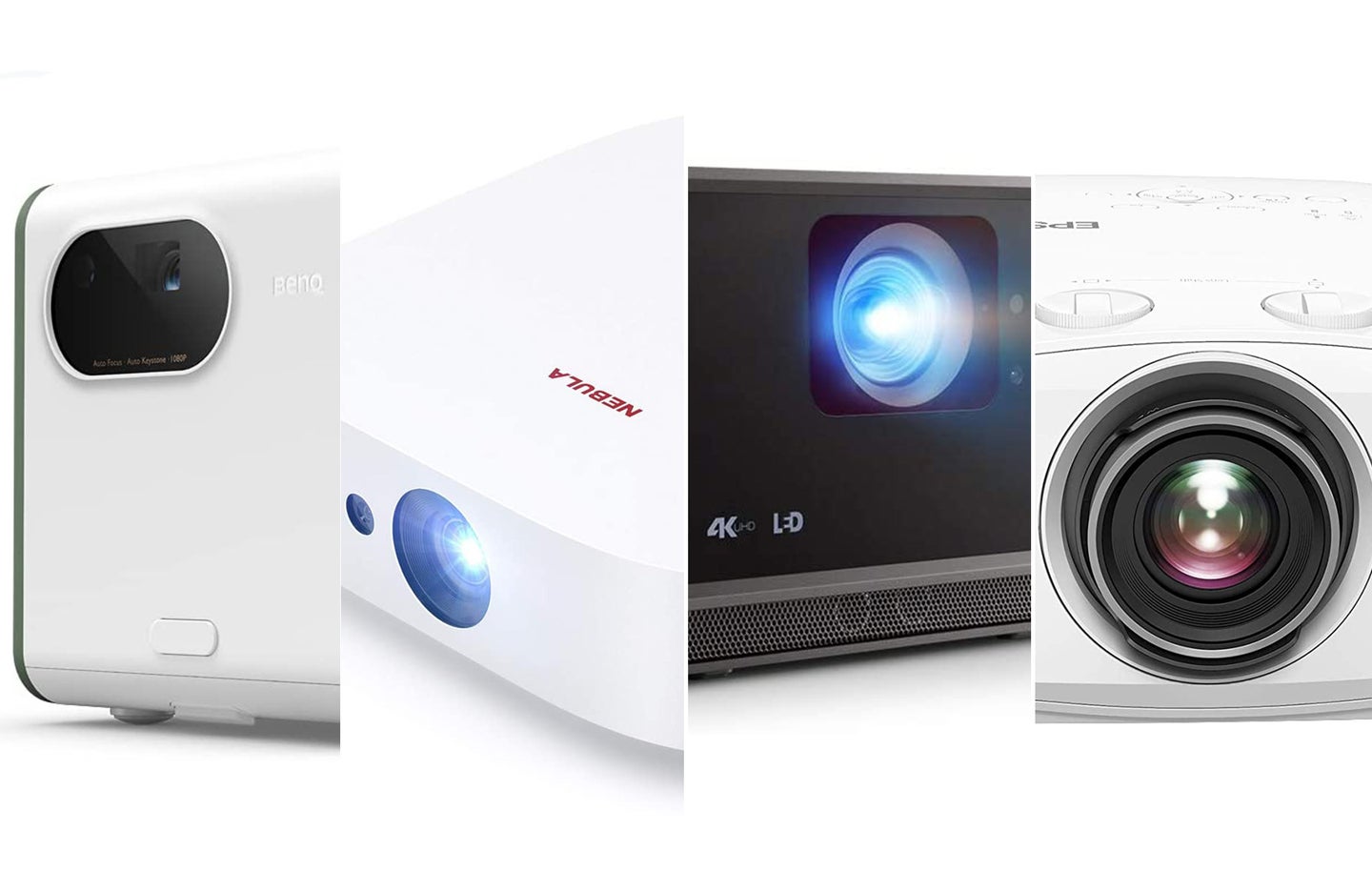
You might not be able to recreate the nostalgia and romance of a 1960s drive-in movie theater, but the best outdoor projectors come close to replicating that magic. Maybe you’re screening an old classic like Sinatra’s original Ocean’s Eleven or a modern classic like George Clooney and Brad Pitt’s Ocean’s 11. Or maybe you really just want to watch Mean Girls in your yard. A good projector can help you get there. But beyond the cinematic possibilities, outdoor projectors also provide an opportunity for you to show your own photography and video work in a totally new venue.
In this guide, you’ll find key points to consider before you purchase an outdoor projector. You should consider what price range, features and capabilities will be important to you.
if you just do a quick search on Google for portable projectors, you’ll quickly see that there’s an enormous price range, from $200 or less to more than $3,000. But price isn’t the only significant variable. For many consumers, ease of use is often the most important consideration. Others don’t mind spending time reading through manuals on PDFs and trying to figure out every last setting.
The point is be sure you’re aware of the type and complexity of the outdoor projector you’re looking to buy so that it meets your needs and how you interact with technology. It’s a factor that will save you a lot of aggravation in the long run.
The best outdoor projectors:
- Best for home: Epson Home Cinema 3800
- Best portable: Anker Nebula Solar Portable
- Best on a budget: GooDee Video Projector
- Best 4K: ViewSonic X10-4KE
- Best water-resistant: BenQ GS50
What to consider when buying the best outdoor projector for your needs
When you’re looking to buy your first outdoor projector, it might be a little confusing in figuring out where to begin. Follow the tips below to help you make that process easier. You’ll also find that as with many complex consumer electronics products, such as TVs, computers and cameras, that when you’re examining what features are available on each outdoor projector, you’ll come across some jargon–or technical language–that might not be familiar to you.
Step one: Determine your budget range
The first thing you should do when buying an outdoor projector is to set a price range for the model you’d like to purchase. If you do this first, then you’ll be able to more quickly narrow the focus of your search.
Step two: Abbreviations for the types of outdoor projectors
As you do your research, you’ll find that there are several types of projectors available. Here’s a short list of the types of projectors :
- LCD: Liquid crystal display projector
- DLP: Digital light processing projector
- LED: Light emitting diode projector
- Laser: Laser projector
Understanding features of outdoor projectors
When you’re looking for the best outdoor projectors, you’ll soon come across a number of technical phrases and terms regarding brightness, resolution and other features. Here are some of the more important ones you’ll want to understand in order to help you make the right choice:
Brightness
The brightness of a projector is measured in lumens (or ANSI lumens). The higher the number, the brighter the projected picture will be. A projector rated at 3,000 lumens will be 3 times as bright as one rated at 1,000 lumens.
Resolution
As a rule of thumb, the larger the image you’re looking for your projector to create, the higher the resolution you’re going to need. So, if your projector is 10 feet away from the screen and the resolution is in 4K (3860 x 2160), the footage will potentially look more detailed than a projected image in 1080 (1920 x 1080) projected from the same distance from the screen. However, if you move the project closer to the screen, the size of the image decreases but the detail increases. Conversely, moving the projector further away from the screen increases the image size.
Unfortunately, the detail as well as other image quality factors, such as contrast ratio, will also drop. Should you buy a 4K projector? While it’s ideal to buy a projector that has 4K resolution, there are still quite a lot of good quality projectors that project at 1080. Additionally, you might look for special features, like Epson’s pixel shifting technology, which doubles the 1920 x 1080 resolution. It’s not true 4K, but the model is less expensive.
Contrast ratio
The contrast is the ratio of dark to light in an image or in video footage, which can affect how sharp, vivid and detailed a movie appears to us. The technical specification is generally presented in the following format: “3000:1.” What this means is that the whitest area of the image is 3000 times brighter than its darkest dark. What’s important to know in setting up any outdoor projector is that even a small amount of ambient light can degrade contrast, which, of course, will diminish image quality.
Throw distance
This term refers to the distance between the projector and the image on the screen. If you have two projectors, one that has a short throw lens and one that doesn’t, a projector that uses a short throw lens (which is a projector that’s positioned anywhere from 3 to 8 feet away from the screen) can produce a larger image than one that doesn’t use such a lens. There are also projectors that come with ultra short throw lenses (which is a projector that’s positioned anywhere from 0 to 4 feet away from the screen).
Other factors and variables to consider
In many ways, there are infinitely more factors and variable to consider in setting up an outdoor projection system than indoors, including:
- Ambient light: If you’ve set up your outdoor projector, screen and sound system in a location that isn’t completely dark, that could affect the picture quality. In some locations, even a full moon could present a problem for your picture quality.
- A good quality screen, either a white or gray screen.
- Consider your audio needs. If the speakers are inadequate, you’ll need to buy a better pair of external speakers (provided the unit has an audio out jack). Another option is to use wireless speakers, which can hookup via Bluetooth or Wi-Fi.
- Make sure you’ve correctly connected any streaming media players you want to use with your projector.
- Check your Wi-Fi settings or your wired (HDMI) connections to make sure you have a good signal, if you’re using a streaming media device. Or, if you’re using a Blu-ray player, make sure that it’s hooked up appropriately.
The best outdoor projectors
Best outdoor projector overall: Epson Home Cinema 3800
Epson Home Cinema 3800 Amazon Renewed
Key Features
- Brightness: 3,000 lumens
- Resolution: 4K Enhancement or (1920 x 1080) x 2 = 3840 x 2160p supported resolution
- Inputs and connectivity: 2 HDMI ports, 2 USB (type A) ports, Bluetooth
Why It Made The Cut:
Although it’s pricey, it has powerful pixel-shifting technology that allows this projector to display excellent image quality.
Pros:
- Displays excellent 4K and HD-resolution content
- Excellent brightness and contrast ratio
- Color is very accurate
- Relatively lightweight and portable
- Easy set up and easy to tweak setting
Cons:
- Expensive
Although some may consider this a pricey outdoor projector, this Epson Home Cinema projector offers a lot of value for the money making it our pick for the best outdoor projector overall. And in some ways, it’s Epson’s pixel-shifting technology at work that makes it such an excellent deal for a family who wants to build a mini-Ziegfeld theatre in their suburban backyard.
Essentially, this Epson projector allows you to experience 4K with pixel shifting. But like most projectors you can set it for lower resolutions, including 720p, 576i and 576p and 480i and 480p. It even has the ability to display 3D video footage in full HD. However, it’s not just the 4K-like resolution that makes this an all-around best buy. It also offers both 10-bit HDR support and HLG support, so it can reproduce even very subtle details in dark shadows and bright highlights, and it does so in a consistent manner, whether you’re showing 4K, HD or SD-resolution footage.
This being one of the best projectors also strikes a nice balance for most people’s needs, in terms of use: It’s an easy-to-use projector that’s also easy to set up, but it allows a variety of ways to easily tweak the settings and for making picture adjustments. It also comes with a nicely designed remote control that gives you quick access to various settings and features, such as keystoning and color modes.
On-board, the system comes with two 10-watt stereo speakers, although there’s an audio jack output for connecting to external audio speakers . The Epson project also offers Bluetooth, for wirelessly casting movies and video and for connecting to an external wireless speaker.
Best portable outdoor projector: Nebula Anker Solar Portable
Nebula Anker Solar Portable NEBULA
Key Features
- Brightness: 400 lumens
- Resolution: 1920 x 1080
- Inputs and connectivity: 1 HDMI port, 1 USB port and 1 USB (Type C) port; Bluetooth
Why It Made The Cut:
It’s lightweight and can be powered by its built-in battery. That makes this Anker Nebula outdoor projector one of the more portable models on the market.
Pros:
- Can run up to 3 hours on battery life
- Easy out-of-the-box experience
- Offers a variety of connectivity options
- Comes with keystoning feature for adjusting the projection
Cons:
- With only 400 lumens, the picture may look washed out if there’s any ambient light.
This is the best portable outdoor projector because we like that this projector is very lightweight and measures around 7.5 x 7.5 x 2.2 inches, which is a very portable size and weight. It also can run on battery power, as well, which is helpful when you don’t have access to AC power to plug in the unit via its power adapter. We also like the adjustable built-in stand, which lets you tilt the unit, if you need to.
This Anker Nebular outdoor projector has Full HD 1080p resolution and can produce a 120-inch image. It also supports HDR10 video. The audio system has two 3-Watt speakers with Dolby Digital Plus. The speakers can also double as a Bluetooth speaker. In terms of brightness, it’s only rated at 400 lumens, which could be a bit dim in some scenarios, depending on the size of the image and how much ambient light there is. The model includes Android TV 9, which offers more than 5,000 apps for the unit, including YouTube, Hulu, Twitch, and more. You can also mirror your content from your smartphone or other mobile devices.
Best budget outdoor projector: GooDee Video Projector
GooDee Video Projector GooDee
Key Features
- Brightness: 6,000 lumens
- Resolution: 1280 x 768 native resolution (with support for 1920 x 1080)
- Inputs and connectivity: 2 HDMI ports, 2 USB ports, Bluetooth
Why It Made The Cut:
This is the best budget outdoor projector that will give you lots of power and options for connectivity.
Pros:
- Inexpensive
- LED light (50,000 hours of light)
- Built-in, dual stereo, 3-Watt audio speakers with SRS sound
- Includes manual keystone & focus controls
Cons:
- Doesn’t include wireless connectivity
- To connect with Apple devices, you need to buy adapters
For a budget-priced outdoor projector, the GooDee HD, which is the 2021 upgraded edition of the model, gives you a lot of value for the money, particularly since they improved the brightness of the lamp. It has a 1280 x 768p native resolution, but it does support 1080p Full HD resolution and can project a picture up to 230 inches. The projector also includes two built-in 3-Watt speakers with an SRS sound system.
The GooDee HD gives you a variety of inputs, including 2 HDMI ports, 2 USB ports. It also offers VGA and AV ports, for connecting multimedia devices, such as Amazon Fire Stick TV, Chromecast, Xbox, Sony PS3 and PS4, as well as other media players. But as with many budget-priced devices, it comes with a few compromises. For instance, there’s no wireless connectivity. Additionally, with some Apple devices, you need to buy adapters, like a lightning-to-HDMI adapter, which isn’t included with the projector.
Best 4k outdoor projector: ViewSonic X10-4KE
ViewSonic X10-4KE ViewSonic
Key Features
- Brightness: 2,400 lumens
- Resolution: 4K (3840 x 2160)
- Inputs and connectivity: 2 HDMI ports, 1 USB (Type C) port, 2 USB 2.0 ports, Bluetooth (in/out)
Why It Made The Cut:
Although it’s pricey, this ViewSonic outdoor projector is the best 4k outdoor projector because it provides you with a bright projection with excellent picture and lots of versatility for connecting to content.
Pros:
- Bright image in 4K resolution (with HDR and HGL support)
- Has auto keystoning and auto focus features to quickly correct projected image
- Short-throw lens lets you project 120-inch image from about 7 feet away
- Offers various ways of streaming, including via USB-C
Cons:
- Expensive
There’s a lot of power built into this expensive outdoor projector, starting with a bright projection, which has 2,400 (LED) lumens, which can provide an image as large as 200 inches. And because the system uses solid-state LED technology (which has an estimated lifespan of 30,000 hours), the system consumes less power than many LCD-type projectors. It supports HDR content, as well, which gives the picture a fuller, more immersive viewing experience.
The projector comes with built-in Dual Harman Kardon Bluetooth speakers and has a short throw lens, which gives you lots of flexibility positioning the projector unit, which can be particularly helpful in outdoor scenarios. It even comes with an easy-carry handle, which makes it even more portable. This ViewSonic projector also supports most media players, PCs, Macs, and mobile device. It connects via and USB-C, as well as Wi-Fi.
Best water-resistant outdoor projector: BenQ GS50
BenQ GS50 BenQ
Key Features
- Brightness: 500 lumens
- Resolution: 1920 x 1080
- Inputs and connectivity: 1 HDMI port, 1 USB (Type C) port, 1 USB port, Wi-Fi
Why It Made The Cut:
This outdoor projector was designed for all types of weather since it has a water-resistant exterior that’s also drop-proof making this projector our pick for the best water-resistant outdoor projector.
Pros:
- Easy to use
- Splash resistant exterior (IPX2 rating)
- Drop Proof (from a height of 2.3 feet)
- Audio system included two 5-Watt speakers and a 10-Watt woofer
- Can create its own Wi-Fi network.
Cons:
- 500 lumens may be a bit dim in some settings
What sets this BenQ projector apart is its rugged exterior: It comes with a water-resistant IPX2 rating, which is useful in outdoor settings when you don’t want your projector to get caught in the rain. But it’s also constructed to be drop-proof, which means it can survive a fall from a height of 2.3 feet. One feature that’s quite nice is that the unit can create its own Wi-Fi network.
It can produce a full HD resolution picture (1920 x 1080) and it also supports HDR10 and HLG, for displaying more details. The system also comes with two built-in 5-Watt stereo speakers, as well as 10-Watt woofer, which should produce more bass in the audio. It also has a built-in stand for tilting the unit up 15 degrees. It also comes with Android TV built into the unit. Other features include autofocus, 3D keystone and 4 corner adjustment.
FAQs
Q: How do I install an outdoor projector in my backyard?
In addition to owning a good-quality outdoor projector, you’ll also want to get a good projection screen. If you don’t have one, you could use a large, white bed sheet. But if you expect there to be any wind, you’ll want to have the sheet tied down so it doesn’t affect the projected image. You’ll want the projected image to be around 120 inches, if you have room, so your screen should be around that size or a little larger. You’ll also want to be sure to set up any audio, depending on the type of outdoor projector you buy. You might only need the on-board audio speakers or, if there’s an audio port on the unit, you can use external speakers. Also, many projectors let you hook up speakers via a Bluetooth connection.
Q: Can you use an outdoor projector inside?
Yes. The only difference between an indoor and outdoor projector is that outdoor projectors are generally lighter (under 10 lbs.) and more compact. Also, some outdoor projectors can run on battery power and come with water-resistant exteriors.
Q: Can you use a gray projection screen for your outdoor projector?
Although a white screen might seem like the obvious choice, a gray screen might actually be more effective. Here’s why: Experts say that if you don’t have an environment that’s completely dark and free of ambient light, a gray screen can do a better job of minimizing the effect of that ambient light on the projected image. It can also allow the projector to maintain the deep black levels of the image.
Methodology
For our ratings of best outdoor projectors, we chose current models (ones that can be commonly bought from major online retail outlets) from the most reputable brands. Compared to introductions of new TV models, there are not as many projectors produced each year. That means that projector models stay in product lines long. That also means some top models might be a few years old. We also researched, selected and tested models that offer the most current or expansive feature sets as well as the latest technologies in the industry. We also made sure the models matched some of the latest standards for streaming media and connectivity, both wired and wireless.
Lastly, we considered a number of other factors, including the unit’s portability (how much the unit weighed) and if the exterior of the unit was water-resistant or included other rugged features. Since some current 4K and FHD projectors weigh more than 40 pounds, we determined that for a projector to be truly portable, it would need to weigh 10 pounds. or less.
A final word on buying your best outdoor projector
When you’re looking to get the best experience with showing movies on the best outdoor projectors, you’ll want to make sure you have the right audio setup for your needs. Here are some options to consider:
- Use the built-in speakers: These days, you’ll find many outdoor projectors offer on-board speakers that offer decent volume.
- Try using a soundbar. For more volume, you can try using a sound bar, which can connect to your projector via an HDMI or 3.5mm audio out jack. It might also connect via Bluetooth.
- Connect a pair of powered speakers: If you’re having a larger type of event in your backyard, where you need to crank up the volume, you can connect a pair of powered speakers to the projector (using various types of wired connections, like 3.5mm audio out cables).
- Wireless Speakers are also an option: You can try to connect via Bluetooth. However, if that doesn’t work, some wireless speakers have 3.5mm audio jacks (or aux in).
The post Best outdoor projectors for every budget appeared first on Popular Photography.
